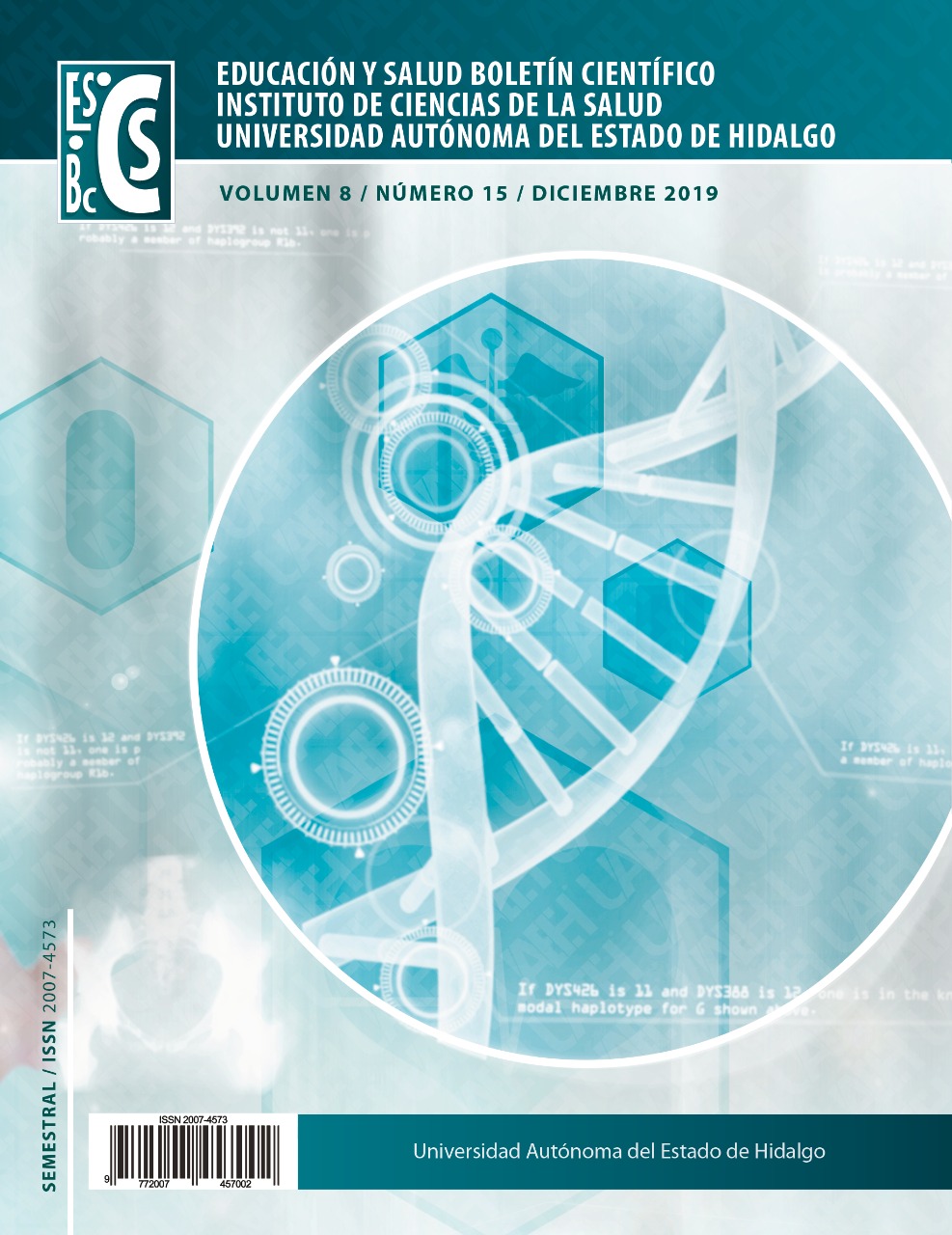Program in Self-efficacy, Positive affect and Self-attribution to promote Healthy Eating Behaviors in Secondary Students
Abstract
The objective of this study was to determine the effectiveness of a program based on universal prevention to modify levels of self-efficacy, positive affect and self-attribution in first and second year secondary school students of a public secondary school in the municipality of Mineral de la Reforma, Hidalgo. The study was quasi-experimental with four groups: two experimental groups and two waiting groups; with pre and post evaluation, participants were randomly assigned according to the grade and group to which they belonged to the experimental groups; and the same to the waiting groups. The total sample was N = 129 adolescents, of which n = 63 belonged to the experimental groups and n = 66 to the waiting groups; n = 68 (53%) are women and n = 61 (47%) men, in an age range of 12 to 15 years (µ = 13 years, SD = .79). A battery of instruments was applied consisting of: Inventory of Self-efficacy for weight control, Scale of Positive and Negative Affection (PANAS) and Self-attribution Inventory for secondary school adolescents. The intervention consisted of 3 sessions of 50 minutes each, which addressed aspects associated with factors promoting Healthy Eating Behaviors. For the statistical analysis, Student's t was used for related samples, the results indicated statistically significant differences in the level of negative self-attribution in the first year experimental group before and after the intervention, t (32) = 2.21, p < 0.03 , significantly reducing negative self-attribution (µ = 2.15) after the intervention (µ = 1.98)
Downloads
References
Organización Mundial de la Salud. Alimentación Sana [Internet]. 31 de agosto de 2018. 2018 [citado el 5 de enero de 2019]. Disponible en: https://www.who.int/es/news-room/fact-sheets/detail/healthy-diet
Ricardo YR, Peralta L, Yaulema L, Pallo J, Caiza V, Parreño Á, et al. Alimentación saludable en docentes. Rev Cuba Med Gen Integr. 2017;33(1):115–28.
Lora-Cortez, CI; Saucedo-Molina T. Conductas alimentarias de riesgo e imagen corporal de acuerdo al índice de masa corporal en una muestra de mujeres adultas de la ciudad de México. alud Ment. 2006;29(3):60–7.
Castells M; Capdevila C; Girbau T; Rodríguez C. Estudio del comportamiento alimentario en escolares de 11 a 13 años de Barcelona. Nutr Hosp. 2006;21(4):517–32.
Garc M, Castro MM. Hábitos de vida saludable desde la adolescencia. Rev estidios Juv. 2016;112(2):107–16.
Salud y Nutricion. Fondo de las Naciones Unidas para la Infancia [Internet]. 2018 [citado el 27 de mayo de 2019]. Disponible en: https://www.unicef.org/mexico/spanish/17047_17494.html
Instituto Nacional de Salud Pública. Encuesta Nacional de Salud y Nutrición de Medio Camino 2016 Informe Final de Resultados [Internet]. 2016. Disponible en: http://oment.uanl.mx/wp-content/uploads/2016/12/ensanut_mc_2016-310oct.pdf
Schonfeld P; Brailovskaia J; Bieda A; Chi-Zhang X; Margraf J. The effects of daily stress on positive and negative mental health: mediation through self-efficacy. Int J Clin Heal Psychol. 2016;16:1–10.
Yıldız MA, Kızıldağ S. Pathways from Positive and Negative Affect to Depressive Symptoms : Multiple Mediation of Emotion Regulation Strategies. 2018;34(2013):241–50.
Myer D. Psicología Social. México: Mc Graw Hill; 1995.
Gillespie R. Connecting self-efficacy of dietary choices and the association with dietary intake among rural adolescents in NorthCcarolina and Kentucky. Diet Hum Nutr. 2017;54:1–27.
Esparza N; Rodríguez M. Factores contextúales del desarrollo infantil y su relación con los estados de ansiedad y depresión. Divers Perspect en Psicol. 2009;5(1):47–64.
Garaigordobil M, Oñederra J. Inteligencia emocional en las víctimas de acoso escolar y en los agresores. Eur J Educ Psychol. 2010;3(2):243–56.
Pettersen G, Rosenvinge JH, Wynn R. Eating disorders and psychoeducation – patients ’ experiences of healing processes. 2011;(12):12–9.
Belak L, Deliberto T, Shear M, Kerrigan S, Attia E. Inviting eating disorder patients to discuss the academic literature : a model program for psychoeducation. 2017;1–7.
Varnado-Sullivan PJ, Horton R. Acceptability of programs for the prevention of eating disorders. J Clin Psychol. 2006;62:687–703.
Stice E; Presnell K. The body Project: Promoting body acceptance and preventing eating disorders. Oxford, editor. New York; 2007.
Black C, Mcdaniel L, Bull S, Powell M, Mcintyre K. Can we reduce eating disorder risk factors in female college athletes ? A randomized exploratory investigation of two peer-led interventions ଝ. Body Image. 2012;9(1):31–42.
Berger U, Schaefer J, Wick K, Brix C. Effectiveness of Reducing the Risk of Eating-Related Problems Using the German School-Based Intervention Program , “ Torera ” , for Preadolescent Boys and Girls. Prev Sc. 2013;(1–11).
Soto D. Intervención Psicoeducativa para Prevenir Factores Psicosociales asociados a Actitudes y Conductas Alimentarias No Saludables en Escolares. 2014.
Galván M, López G, Gúzman R, Fernández TL, Atitlán A, Vargaz E, Amezcua A, Hernández J. Educación en Salud y Nutrición en Escuelas Primarias : Los Proyectos Formativos Como Estrategia Innovadora de Planificación Didáctica . 2016.
Gómez-Peresmitré G, Platas S, Pineda-García G, Guzmán- Salda R, León-Hernandez R. Validation of an instrument of self-efficacy for the prevention of obesity in school children. Rev Mex Trastor Aliment. 2017;8:21–30.
Gómez-Peresmitré G, Platas S, Pineda-García G, Corona N, González V. Propiedades psicométricas de la Escala de Afecto negativo y Afecto positivo (PANAS) en adolescentes de secundaria. La Psicol Soc en México. 2018;17.
Gómez-Peresmitré G, Platas S, Pineda-García G, Corona N, González V. Propiedades psicométricas del inventario de autoatribución para adolescentes de secundaria. La Psicol Soc en México. 2018;17.
Moreno MOG. Trastornos Alimentariosy su relación con la Imagen Corporal y la Autoestima en Adolescentes. Ter Psicol. 2009;27(2):181–90.
Ramos-Díaz E; Rodríguez-Fernández A; Antonio-Aguirre I. El autoconcepto y el bienestar subjetivo en función del sexo y del nivel educativo en la adolescencia. Psicol Educ. 2017;23:89–94.
Crocker J, Sommers SR, Luhtanen R. Hopes dashed and dreams Fulfilled: Contingencies of self-worth and graduate school admissions. Personal Soc Psychol Bull. 2002;28(1275–1286).
McCabe MP, Ricciardelli LA, Salmon JO. Evaluation of a prevention program to address body focus and negative affect among children. J Health Psychol. 2006;11(4):589–98.
Muros JJ, Ocaña-lara FA. Results of a 7-Week School-Based Physical Activity and Nutrition Pilot Program on Health-Related Parameters in Primary School Children in Southern Spain. 2013;248–61.












